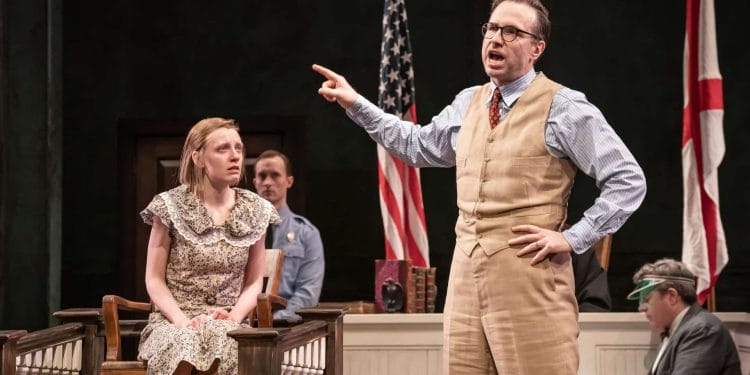 The much anticipated transfer of Aaron Sorkin’s To Kill a Mockingbird has opened at the Gielgud Theatre, almost two years later than originally planned. The Broadway production is on a hiatus and is slated to return later this year, but the London production, also directed by Bartlett Sher brings the classic story to the West End stage.
The much anticipated transfer of Aaron Sorkin’s To Kill a Mockingbird has opened at the Gielgud Theatre, almost two years later than originally planned. The Broadway production is on a hiatus and is slated to return later this year, but the London production, also directed by Bartlett Sher brings the classic story to the West End stage.
Though it’s worth noting that this production of To Kill a Mockingbird, adapted by an Oscar winning screenwriter, takes a different structure to Harper Lee’s novel, and the film version starring Gregory Peck. Lee’s novel, one of the biggest selling ever and to be found in classrooms across the world, is based on the author’s real life experiences of growing up in America’s deep south.
But the portrayal of racism, and the lawyer Atticus Finch as the ‘white saviour’ has long drawn criticism, and this 21st century adaptation seeks in some way to address this. Indeed, the original production found itself embroiled in its own courtroom battle, when the estate of Harper Lee claimed that Sorkin had strayed too far from the original characters and story.
Where Harper Lee took a leisurely route to the impactful courtroom scenes, Sorkin introduces them almost immediately. We alternate between the courtroom and scenes which then add context to the narrative, and while Scout was Lee’s protagonist, here it is Atticus Finch who is framed as the central character.
This story of a Black man falsely accused of raping a white woman is just as shocking, if not more so, in 2022 as it was in 1960. The language used by Harper Lee can also be found in this stage adaptation, and whilst deeply troubling to hear, it does of course reflect the reality of 1930’s Alabama.
A red barn door lifts to reveal Miriam Buether’s dilapidated warehouse, which elegantly transforms into the courtroom, the Finch’s front porch, and various other key locations. The relative simplicity that sees us presented with widows and doors, but not walls, is bathed in a warm glow of Jennifer Tipton’s lighting design.
Like the Broadway production, the child characters of Scout, Jem and Dill are played by adults. Somehow it amplifies their innocence, and where once it was Scout who was the sole narrator, now that role is shared by brother, sister, and summer friend. The change in structure also introduces a new slant for the ‘children’ who interrogate the events they see and hear more closely.
Rafe Spall leads the cast as a simmering Atticus Finch, it’s a powerful performance and one that will long be remembered. Jude Owusu plays the accused Tom Robinson, who is given more of a voice in this version of To Kill a Mockingbird, Owusu takes the audience on an emotional journey that needs to be experienced to be fully understood.
Also given a bigger role is the Finch’s maid, Calpurnia, decades of subjugation come to the boil in Pamela Nomvete’s searing portrayal of the character. Anger etched on Nomvete’s face translates to blistering monologues that have the audience enthralled.
Like the novel, there is a lot of humour in this play. Much of it comes from the children’s naivety, and Gwyneth Keyworth does a remarkable job of portraying Scout as the younger more inquisitive sibling. David Moorst brings the right level of awkwardness to the wiser than he looks Dill.
Harry Redding makes his professional stage debut as Jem, and it is without a doubt one of the most impressive and compelling debuts you’ll ever see. Redding’s skill as a storyteller is second to none, and keeps the audience gripped to every syllable.
Bartlett Sher will direct My Fair Lady later this year, and expectations will surely be through the roof following this incredible production. The near three-hour running time simply flies by as Sher guides the audience through a traumatic, but riveting journey. Aaron Sorkin’s To Kill a Mockingbird is powerful, moving, and brimming with humour; a magnificently awe-inspiring piece of theatre.
























Comments 12